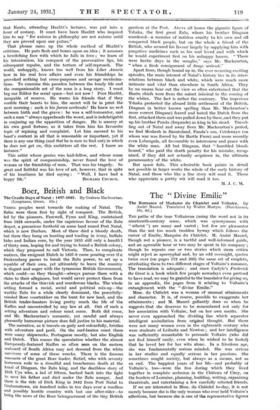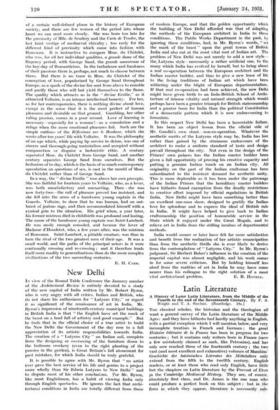The " Divine Emilie"
THE paths of the true Voltairean (using the word not in its nineteenth-century sense, which was synonymous with " atheist ") are many and varied ; but few are pleasanter than the not too much trodden byway which follows the career of Emilie, Marquise du Chatelet. M. Andre Maurel, though not a pioneer, is a tactful and well-informed guide, and an agreeable hour or two may be spent in his company ; though he repeats one or two stories which stern critics might reject as apocryphal and, by an odd oversight, quotes twice over (on pages 172 and 202) the same set of couplets, attributing them to two different stages of Voltaire's romance. The translation is adequate ; and since Carlyle's Frederick the Great is a book which few people nowadays even pretend to have read, we may be grateful to the translator for giving us, in an appendix, the pages from it relating to Voltaire's entanglement with the " divine Emilie."
Mme. du Chatelet was a woman of unusual attainments and character. It is, of course, possible to exaggerate her attainments ; and M. Maurel gallantly does so when he suggests that she deserves to be remembered not only for her association with Voltaire, but on her own merits. She never even approached the dividing line which separates intelligent assimilation from original thought. But there were not many women even in the eighteenth century who were students of Leibnitz and Newton ; and her intelligence was sufficiently remarkable to persuade Voltaire (who did not fool himself easily, even when he wished to be fooled) that he loved her for her wits alone. In a frivolous age, she was fundamentally serious minded. She was serious in her studies and equally serious in her passions. She sometimes sought society, but always as a means, not as an end. The happiest years of her life—and probably of Voltaire's, too—were the five during which they lived together in complete seclusion in the Chateau of Cirey, on the borders of Lorraine, planning, building, writing, organizing theatricals, and entertaining a few carefully selected friends.
If we are interested in Mme. du Chatelet to-day, it is not merely because she is the only woman who ever held Voltaire's affections, but because she is one of the representative figures
of a certain well-defined phase in the history of European society, and there are few women of the period into whose heart we can read more closely. She was born too late for the preciosity of Mlle. de Scudery and the Carte de Tendre, the last faint vestige of mediaeval chivalry ; too early for the different kind of preciosity which came into fashion with Rousseau. It is instructive to compare Mme. du Chiitelet, who was, for all her individual qualities, a grande dame of the Regency period, with George Sand, the grande amoureuse of the hey-day of Romanticism. In the turbulence and frankness of their passions there is, perhaps, not much to choose between them. But there is no trace in Mme. du Chtitelet of the conception of love, popularized by George Sand throughout Europe, as a spark of the divine fire sent from above to ennoble and purify those who will but yield themselves to the flame. The quality which attracts us in the divine Emilie," as it attracted Voltaire, is an intense intellectual honesty. For her, as for her contemporaries, there is nothing divine about love, except in the sense that it is the most perfect of human pleasures and desirable on that ground. Gambling, her other ruling passion, comes in a poor second. Love of learning is necessary—especially for a woman !—as a consolation and a refuge when the more emotional pleasures fail. Such are the simple outlines of the Ref lexions sur le Bonheur, which she wrote after ten years' life with Voltaire. It was the philosophy of an age which, while paying lip service to deism, was one of sincere and thorough-going materialism and accepted without compunction or disguise a hedonistic ethic. A century separated Mme. du Chatelet from George Sand, and another century separates George Sand from ourselves. But the hedonism of to-day, which is the basis of so much contemporary speculation on questions of sex, is cast in the mould of Mine. du Ctatelet rather than of George Sand.
In a way, the " divine Emilie " rose above her own precepts. She was faithful for fourteen years to Voltaire, who, as a lover, was both unsatisfactory and. unexacting. Thee—she was now forty-two—the call of pleasure proved too insistent, and she fell into the arms of a handsome young captain in the Guards. Voltaire, to show that he was human, had an out- burst of jealous rage, and then accommodated himself with a cynical grin to the situation. His grief when, a year later, his former mistress died in childbirth was profound and lasting. The name of the handsome young captain was Saint-Lambert. lie was easily enough consoled, and became the lover of Madame d'Houdetot, who, a few years after, was the mistress of Rousseau. Saint-Lambert, a pitiable creature, was thus in turn the rival of the two greatest men of their age. It was a small world, and the paths of the principal actors in it were continually crossing and re-crossing ; and it therefore lends itself more readily to generalizations than do the more complex *civilizations of the two succeeding centuries.
E. H. CARR.







































 Previous page
Previous page